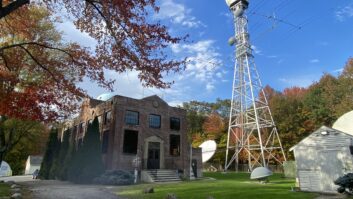A determined pursuit to build a brand-new AM station in the Los Angeles area has apparently come to an end.
Levine/Schwab Partnership, also known as Schwab MultiMedia LLC, has gone to great lengths to try to save its construction permit to build in Culver City, Calif. But it was dealt another and perhaps final blow last week when a panel of the U.S. Court of Appeals for the D.C. Circuit ruled against it.
Schwab MultiMedia first applied to build a station in 2004. It was later awarded a CP in 2016 for a Class B AM directional station at 1500 kHz to be called KWIF.
But absent a “tolling” extension from the FCC, a broadcaster must build a station within three years, according to the FCC, and the station remains unbuilt. Schwab Multimedia cited the pandemic, California wildfires and a challenge of the CP by a first-adjacent station in the market for the delays in construction.
The commission granted three extensions to Schwab MultiMedia to pause the CP clock, but denied a fourth request more than a year ago.
Schwab appealed. On Friday the appeals court panel unanimously rejected it. The opinion, written by Judge Justin Walker, found that the permitee had failed to construct the station because it lost its site, which is not considered a valid reason for tolling. The clock can only be halted for circumstances beyond a permitee’s control.
Details
In 2020 Schwab MultiMedia had submitted an application to modify its CP after the landlord of the original site withdrew permission to build. According to the court’s case summary, Schwab proposed to use a new site at the Culver City Mall. However, the Media Bureau denied its petition for reconsideration.
Schwab then filed an Application for Review before the full FCC, but the commission upheld the bureau’s decision. The FCC said site loss was the actual cause of Schwab’s inability to construct. It also dismissed the application to modify the CP because, without tolling, the permit had expired, Judge Walker wrote.
The plaintiff asked the court to reverse the FCC’s decision, reinstate Schwab’s construction permit and give it additional time to build, which it is prepared to do. However, “The FCC views site selection as an independent business decision within a permittee’s control,” the judge wrote.
The court’s opinion stated: “Because the agency’s decision was reasonable and reasonably explained, we affirm.”
Reaction
A representative of Schwab MultiMedia expressed disappointment in a statement emailed to Radio World:
“In effect, the court has granted the FCC carte blanche to make rulings not based in fact or in conformance with agency precedent,” it said.
It said it had been granted tolling in spring of 2020 for pandemic-related construction delays “just like dozens of other stations facing that unprecedented scenario,” then sought an extension in September because of the ongoing impact of the pandemic including the unavailability of broadcast crews. “That was a mere six months from the official emergency declaration of the pandemic.”
The company believes the FCC’s Audio Division “inexplicably” denied its request on a procedural technicality and that the Media Bureau claimed, “without evidence,” that the true reason for the failure to construct was site loss — “which, contrary to the FCC’s claims, has been found at times to be a basis for tolling of a construction permit.” It also said, “The FCC knew very well that a lease was not necessary, but the court did not. But we had one anyway, and it was in the evidence we submitted to the court.”
Schwab believes the court is allowing a federal agency to rule in an arbitrary and capricious manner. Yet the court wrote that the FCC’s decisions “were not arbitrary and capricious,” that they were “reasonable and reasonably explained,” and that the FCC denied tolling request on three reasonable, underlying determinations.
“In the end,” Schwab wrote, “a court too willing to defer to an agency moving goal posts rather than doing what it should to promote the public interest will preclude KWIF from serving the people of the L.A. Basin.”
Schwab believes that KWIF might have been “the very last new AM station ever constructed” and felt that it had been derailed by a global pandemic and “baseless challenges” from a competitor that consumed tolling time.
First-adjacent station KSPA(AM) in Ontario, Calif., had opposed the CP, but the FCC dismissed its opposition to the application for review as untimely without ruling on its merits.







